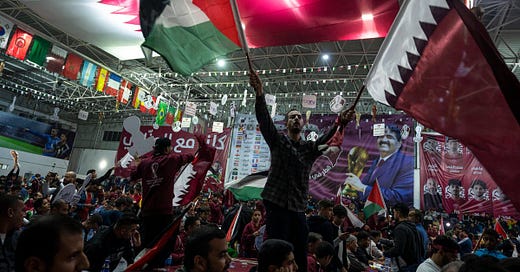While Israel’s genocide in Gaza continues, and the violence of bombings escalates in Lebanon and across the region, Benjamin Netanyahu’s long-standing ambition to establish Israel as the dominant power in the Middle East is closer to becoming reality.
Bibi’s delusion, driven by a hardline Zionist ideology, is pushing the Middle East to the brink of devastation. And in most part Arab nations have themselves to blame for allowing a crazed-lunatic destroy the region.
Decades of US meddling, division and conquest, money deals, corruption and coups, all for oil and the petrodollar, have helped plunge and lay the foundation for what where the Middle East is now.
If ever the Arab nations had or were to have been unified, the Middle East would be the most powerful economic block region in the world, and Netanyahu, Israel and the US would have been sent packing long ago.
But instead, we’ve had decades of terror inflicted on Palestinians, Lebanese, Syrians, Libya and Iraq destroyed, sanctions placed on Iran and the list goes on, while Jordan, Saudi Arabia, the UAE, Egypt, Kuwait and Qatar remain puppets of the US.
Is there any wonder the Middle East is in the mess it’s in?
Netanyahu’s expansionist vision, backed by unwavering US support, could soon become an unchallenged reality unless Arab nations unite to confront Israel head-on.
Netanyahu’s agenda has been built on a foundation of territorial expansion and military supremacy, and it’s never been a secret. Since his early political years, he’s championed policies to expand Israeli settlements, particularly in the West Bank, while actively opposing a two-state solution.
And yet his rhetoric cloaked in the language of security, signals a broader agenda to reshape the region by extending Israel’s borders and influence.
The normalisation agreements under the Abraham Accords are the latest manifestation of this ambition, framing economic ties as peace deals while sidestepping the plight of Palestinians.
The Arab world’s failure to present a unified front against Israeli aggression has been central to Netanyahu’s success. The Arab League, once a robust advocate for Palestinian rights, has become increasingly fragmented.
Competing national interests and historical divisions have eroded its influence, leaving Arab nations more susceptible to being manipulated. Its failed disunity has not only empowered Israel’s territorial expansion but has created opportunities for Washington to exploit regional rivalries in its divide-and-conquer approach.
US foreign policy has played a significant role in enabling Israel’s ambitions. For decades, it’s provided Israel with diplomatic cover, military support, and economic aid, allowing it to carry out aggressive policies with impunity.
Washington’s strategy of “divide and conquer” has kept the Arab world fragmented, exploiting sectarian divides and geopolitical rivalries.
By maintaining bilateral relations with individual Arab states and sidelining collective diplomacy, the US has ensured Israel’s regional dominance remains largely unchallenged.
It’s an approach that has left only a few to resist Israeli expansionism. It’s been the “Axis of Resistance,” - Hezbollah, Iran, Syria, and Yemen, which has borne the brunt against Israel’s aggression. And despite economic sanctions, military pressures, and political isolation, they’ve stood resolute in their resistance.
And yet it’s the broader Arab world that has allowed the burden to fall on a few. The reluctance of other Arab nations to resist weakens the collective and raises questions about their commitment to Palestinian liberation and regional stability.
Israel’s aggression toward Lebanon illustrates the pressing need for Arab unity. Netanyahu justifies it as a response to “terror threats,” but it’s clear he wants to weaken Hezbollah, destabilise Lebanon, and assert control over its northern neighbour - part of a broader strategy to reshape regional borders and extend Israel’s sphere of influence.
The bombings in Lebanon, is more than a war; it’s a reflection of a regional struggle. Israel’s history of invasions and occupations in Lebanon, particularly in 1982 and 2006, has left deep scars - underscoring the urgency for a united Arab response.
Lebanon’s suffering should be a rallying cry for Arab nations to put aside their differences and come together against a common threat.
The reluctance of Arab leaders to confront Israel’s aggression head-on isn’t just a tactical failure; it’s a moral one. For decades, sectarian divides, personal rivalries, and geopolitical calculations have prevented the formation of a cohesive Arab strategy. By prioritising narrow national interests over regional solidarity, Arab nations have allowed Israel’s plans to advance largely unchecked.
Arab disunity has made them their own worst enemies, allowing Netanyahu’s aggressive expansionist agenda to thrive.
Arab nations must engage in a comprehensive diplomatic offensive, using the UN and the International Criminal Court to hold Israel accountable and it must be supported by economic sanctions, boycotts of Israeli products, and arms embargoes.
Furthermore, Arab leaders must embrace reform to allow for greater participation in foreign policy decisions.
It's no longer acceptable to leave resistance solely to the “Axis of Resistance.” The time’s come for all Arab nations to put aside religious differences, historical animosities, and political rivalries. Unity, rather than division, must define the future of the Middle East.
Netanyahu’s delusion of regional dominance can only become a reality if the Arab world remains fragmented.
The weeks and months ahead will determine whether Arab nations can muster the political will to confront Israel’s expansionist ambitions or allow Netanyahu’s vision of dominance to reshape the region at their expense.





Arab elites have never really cared that much about the Palestinians, always seeing them as an obstacle to normalisation with Israel, and seeing them as a nuisance as refugees in their countries.
I totally agree with you, George, but let's be honest here: it's not going to come from the leaders but from the people. Someone said recently, both accurately and succinctly, it's the people of the world versus the governments (and I would add the oligarchs). They have all the weapons and money, we have bodies and righteousness.